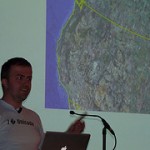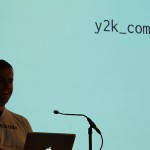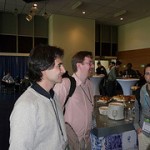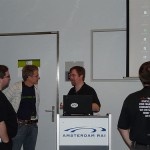Purpose of the entry
On Friday June 12th 2009 the Dutch PHP Conference started with a small introduction by Cal Evans, director of PCE at Ibuildings and previous editor-in-Chief of DevZone at Zend, Inc.
Cal welcomed us all at the third edition of what will become one of the major players concerning php conferences in Europe. The conference itself is packed with great talks on various subjects regarding programming. From the novice topics like the excellent talk from Ben Ramsey on “Grokking the REST Architecture” to the more advanced like “Trees in the Database: Advanced Data Structures” by Lorenzo Alberton. The latter I could unfortunately not attend, a man has got to make choices. I was attending Ben Ramsey’s second talk on REST because the first one was really really interesting. I did not have to choose which opening keynote to attend. There is only one per day and the first day was opened by Andrei Zmievski. He is a real entertainer. He brought the evolution of PHP, the new features in PHP 5.3 and PHP 6.0. He also said what PHP 7.0 will not be.
In this entry I will give an overview on the talk given by the main guy responsible for the official PHP releases.
Overview
- What is PHP
- PHP is mature and version 5.3 will arrive shortly
- PHP 6.0 is coming and with it Unicode and traits
- PHP7.0
- Resources
- Closing notes
What is PHP
PHP or Hypertext PreProcessor is a dirty language with a very low learning curve. This has been the success of the dominating web language. It is dirty because it was build upon release upon release. Never able to clean up some errors made in the beginning when the language was starting to evolve. This resulted in some function parameter inconsistencies and design issues that could have been done a different way. Because PHP took features from other languages it is a mix of various things. PHP is a ball of nails, it is not a full breed, but more like a mutt. But you got to love the mutt. It works brilliantly and does what it needs to do. And with every release it becomes more and more mature, more and more beautiful. Mutts often are stronger than full breeds also…
PHP is mature and version 5.3 will arrive shortly
Within a couple of weeks the long awaited PHP 5.3 version will be released as stable.
Like PHP 5.1 made a huge leap with the PDO integration so will 5.3 with namespaces. Andrei made some jokes about the decision to use backslashes as the namespace symbol. He did this with mails send to the mailing list and I must say it was hilarious. The message he wants to give to the community is: Yes we have used the \, stop whining about it and start adopting it. You have no choice. Decisions have to be made and we, the PHP Core developers have made ours. Personally I am sure namespaces will change the way programmers and framework architects develop their applications. Maybe not immediately but over the years they will.
Things like lambda functions and closures are also supported and I am positive people will start to adopt to this new functionality right away. I know I will.
As I said before PHP is a mutt and it has adopted a lot of features from other languages. Java is one of them. The tradition is continuous and with the introduction of phar files I am positive a lot of deployment will change. Phar allows you to pack your entire project into a single file, pretty much like a tar or zip file. You can browse and include these files from the Phar file from within your code as if it was a normal directory on your filesystem. You can also execute your application from within the file entirely. As you can imagine this gives big benefits on deployment where some files always have to be uploaded as a single pack to ensure the sequential uploading of files to avoid the resulting breaking of the application for a period of time. Or the way libraries and common applications like phpMyAdmin are distributed.
If you want to know more about lambda, closures, phars and namespaces there are some great resources available and I will give you a list at the end of this article.
PHP 6.0 is coming and with it Unicode and traits
Traits is PHP solution on the multiple inheritance problem. There is no diamond issue here and still you can use the functionallity of multiple classes from within a class. You will still be limited to inheritance from a single parent, and this is a good thing, but you can import (dynamically copy/paste) methods from a secondary or n+ other classes. Unicode will solve the internationalization problems, problems with some string functions and even allow chinese programmers to program in chinese. Do not expect Andrei or me for that same matter to debug such applications. 🙂
PHP7.0
PHP7.0 is coming and it will offer lots more of functionality and great stuff. What it will be nobody knows (maybe some do?), but what is known is that it will not be PHP designed from scratch. A version polished to perfection. The ultimate clean language. Such a language does not exist and if someone is eager to build it, it will not be called PHP. PHP is a powerful tool. If used in experienced hands you can develop applications with it that will astound everybody. Go and use PHP. And if you are using PHP love it, cherisch it and welcome the changes.
Resources
- The Dutch PHP Conference
- Andrei Zmievsky
- Namespaces
- Phar
- Of Lambda Functions, Closures, Traits …
- Traits Proposal
- Unicode
- Grokking the REST Architecture
Closing notes
Andrei Zmievski is a wonderful speaker with lots of charisma. With his opening keynote he awoke my interest of using all the new functionalities future releases of PHP will offer. As a core PHP developer and leader of the PHP-GTK project he was not afraid to make various jokes on himself, the community and PHP. Which made the talk very lighthearted and easy to digest. One of the cool stuff was when he pointed to an ini setting called y2k_compliance in PHP3 which did nothing but made you feel safe. Like a placebo for PHP. That was so much fun!
His talk made me keen on using all the new PHP 5.3 features and made me look forward to using PHP 6.0. And with me a lot of other developers were feeling good at heart and ready to attend all the talks the dutch PHP conference had to offer. The stage was set to be one of the best content wise conferences I ever attended.
Happy coding from sunny Belgium,
Nick Belhomme



